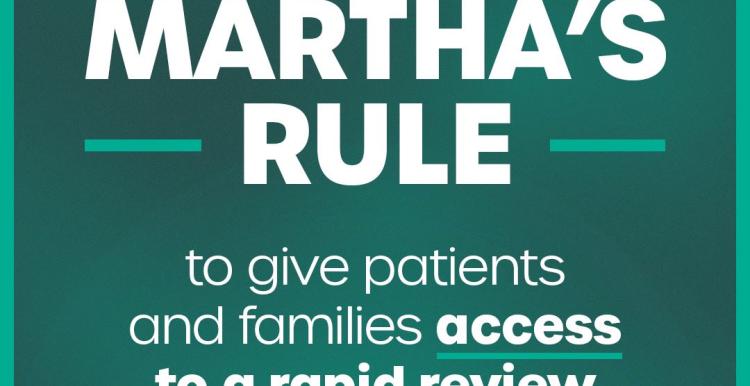NHS to roll out ‘Martha’s Rule’

The head of the NHS has today announced the rollout of ‘Martha’s Rule’ in hospitals across England from April, enabling patients and families to seek an urgent review if their condition deteriorates.
The patient safety initiative is set to be rolled out to at least 100 NHS sites and will give patients and their families round-the-clock access to a rapid review from an independent critical care team if they are worried about their or a loved one’s condition.
This escalation process will be available 24/7 to patients, families and NHS staff, and will be advertised throughout hospitals, making it quickly and easily accessible.
NHS chief Amanda Pritchard said the programme had the potential to “save many lives in the future” and thanked Martha’s family for their important campaigning and collaboration to help the NHS improve the care of patients experiencing acute deterioration.
Thirteen-year-old Martha Mills died from sepsis at King’s College Hospital, London, in 2021, due to a failure to escalate her to intensive care and after her family’s concerns about her deteriorating condition were not responded to promptly.
Extensive campaigning by her parents Merope and Paul has seen widespread support for a single system that allows patients or their families to trigger an urgent clinical review from a different team in the hospital if the patient’s condition is rapidly worsening and they feel they are not getting the care they need.
This national programme will build on NHS England’s Worry and Concern pilots launched at seven trusts last year, which developed and tested escalation methods for patients’ and families’ concerns.
Merope Mills and Paul Laity, Martha’s parents, said: “We are pleased that the implementation of Martha’s Rule will begin in April. We want it to be in place as quickly and as widely as possible, to prevent what happened to our daughter from happening to other patients in hospital.
“We believe Martha’s Rule will save lives. In cases of deterioration, families and carers by the bedside can be aware of changes busy clinicians can’t; their knowledge should be recognised as a resource. We also look to Martha’s Rule to alter medical culture: to give patients a little more power, to encourage listening on the part of medical professionals, and to normalise the idea that even the grandest of doctors should welcome being challenged. We call on all NHS clinicians to back the initiative: we know that the large majority do listen, are open with patients and never complacent – but Martha’s doctors worked in a different culture, so some situations need to change.
“Our daughter was quite something: fun and determined, with a vast appetite for life and so many plans and ambitions – we’ll never know what she would have achieved with all her talents. Hers was a preventable death, but Martha’s Rule will mean that she didn’t die completely in vain.”
As part of Martha’s Rule, health staff at participating hospitals will also formally record daily insights and information about a patient’s health directly from their parents or families making sure any changes in behaviour or condition are noted by the people who know the patient best.
